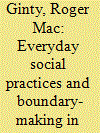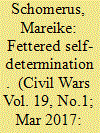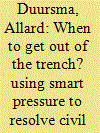| Srl | Item |
| 1 |
ID:
153697


|
|
|
|
|
| Summary/Abstract |
Based on empirical evidence and conceptual scoping, this article builds a typology of everyday social practices in a deeply divided society. The typology distinguishes between moderating and non-moderating practices relating to boundaries. Based on a case study of contemporary Lebanon, it describes how boundary making and maintaining are the stuff of everyday life in deeply divided societies. But it also describes how the society under study also contains much evidence of fluidity and permeability in relation to boundaries. Many of these instances of boundary crossing do not threaten the meta politico-religious boundary, but they do compel us to re-evaluate views of deeply divided societies as comprised of homogenous and uncompromising blocs.
|
|
|
|
|
|
|
|
|
|
|
|
|
|
|
|
| 2 |
ID:
153698


|
|
|
|
|
| Summary/Abstract |
The interpretation of self-determination as a vote for secession shaped the state that South Sudan has become since the 2011 referendum. Self-determination, this paper argues, is a democratic political process in which citizens determine their preferred form of statehood and nature of governance for their country. In South Sudan, however, political actors—with international support—established conditions that reduced such complex democratic processes to narrow technical matters. Equating self-determination with secession consolidated political and military domination in a process designed to end such domination. This was done at the expense of a more inclusive, process-oriented and political interpretation of self-determination.
|
|
|
|
|
|
|
|
|
|
|
|
|
|
|
|
| 3 |
ID:
153700


|
|
|
|
|
| Summary/Abstract |
The role of war in processes of state-making has long been hotly disputed. Although generally considered an African ‘success story’, the case of Somaliland, whose unilateral declaration of independence was embedded in violent conflict, may be instructive. Applying the conceptual prism of ‘rule standardization’, this article argues that episodes of large-scale violence were constitutive of Somaliland’s state-making trajectory. Based on theoretical reasoning and empirical findings, the article concludes that, while collective political violence is neither an angel of order nor a daemon of decay, war can be constitutive of state-making under the condition that it advances institutional and identity standardization.
|
|
|
|
|
|
|
|
|
|
|
|
|
|
|
|
| 4 |
ID:
153701


|
|
|
|
|
| Summary/Abstract |
Many scholars and policy practitioners believe that the US invasion of Iraq triggered a civil war. Several major scholarly data-sets, however, do not code a civil war, due to the challenge of coding multiple simultaneous patterns of violence. Further, many political actors have resisted the term, due to obvious political and public relations concerns. This paper analyses these discrepancies in the use of the label, arguing that, for scholars, the coding problem could limit or even bias models of civil war, while for policymakers, the failure to see Iraq’s civil war as such has contributed to major policy failures, from the Bush administration’s state of denial early in the war to the Obama administration’s withdrawal and the subsequent reescalation of violence.
|
|
|
|
|
|
|
|
|
|
|
|
|
|
|
|
| 5 |
ID:
153699


|
|
|
|
|
| Summary/Abstract |
This article puts forward a theory of smart pressure, which emphasises that third-party pressure only works if the conflict parties under pressure can agree with the endpoint of this pressure. Hence, a potential mutually acceptable agreement needs to be formulated before a mediator starts to apply pressure. To this argument, this article employs two case studies: the mediation efforts leading up to the Sudan Comprehensive Peace Agreement concluded in 2005 and the Darfur Peace Agreement concluded in 2006. These cases support the smart pressure theory and suggest that mediators need to be modest about what they can accomplish using pressure.
|
|
|
|
|
|
|
|
|
|
|
|
|
|
|
|